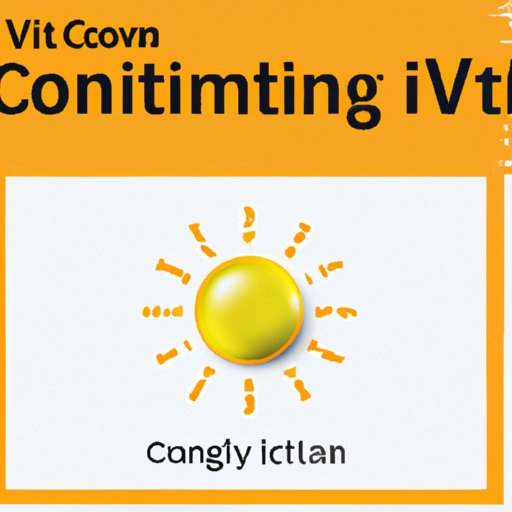Introduction
Vitamin C is an essential nutrient that plays a key role in supporting the immune system and overall health. It’s found in many fruits and vegetables, as well as dietary supplements. But just how much vitamin C should you take, and what are the potential risks of taking too much? Here, we explore the recommended daily dosage, potential side effects, and tips for getting the most out of your vitamin C intake.
Overview of Vitamin C and its Benefits
Vitamin C, also known as ascorbic acid, is a water-soluble vitamin that’s naturally present in some foods like oranges, peppers, and broccoli. It’s also added to many foods, including breakfast cereals, juices, and processed foods. According to the National Institutes of Health, Vitamin C is necessary for the growth, development, and repair of all body tissues. It helps form collagen and elastin, which helps wounds heal, and it helps the body absorb iron from plant-based foods. Additionally, vitamin C has antioxidant properties that help protect against the damage caused by free radicals.
Understanding the Recommended Dosage
The amount of vitamin C you need each day depends on your age. According to the Office of Dietary Supplements, the recommended dietary allowance (RDA) for adults is 90 milligrams for men and 75 milligrams for women. For smokers, the RDA is significantly higher at 125 milligrams per day. The Linus Pauling Institute recommends that adults consume at least 400 milligrams of vitamin C daily, although some research suggests that intakes up to 1,000 milligrams could still be beneficial.
Potential Side Effects of Taking Too Much Vitamin C
Although vitamin C is one of the safest vitamins to take, taking too much can lead to unpleasant side effects. According to the Mayo Clinic, these may include nausea, vomiting, heartburn, headache, and insomnia. In rare cases, taking high doses of vitamin C can cause more serious problems such as kidney stones, anemia, and gout.
Symptoms to Look Out For
In general, the body will excrete any excess vitamin C through urine. But if you think you’re taking too much, look out for signs of toxicity. These may include abdominal cramps, diarrhea, fatigue, and an increased risk of kidney stones.
Long-Term Health Complications
A study published in The American Journal of Clinical Nutrition found that taking more than 2,000 milligrams of vitamin C daily for long periods of time may increase the risk of developing certain cancers. According to the authors of the study, “long-term supplementation with vitamin C may not be beneficial and could even be harmful.” So, it’s important to stay within the recommended dosages to avoid any potential complications.

Selecting the Right Vitamin C Supplement
If you’re looking to supplement your diet with vitamin C, there are a few things to consider when selecting a supplement. First, you’ll want to make sure you’re buying a quality product. Look for products that have been tested and verified by a third-party organization such as the US Pharmacopeia or ConsumerLab.com.
Types of Supplements
There are two main types of vitamin C supplements: ascorbic acid and ascorbyl palmitate. Ascorbic acid is the most common form and is usually cheaper than ascorbyl palmitate. However, ascorbyl palmitate is more easily absorbed by the body and may be better tolerated.
Sources of Vitamin C
In addition to dietary supplements, there are many natural sources of vitamin C. Fruits and vegetables are excellent sources, with citrus fruits, strawberries, bell peppers, broccoli, and Brussels sprouts being particularly rich in vitamin C. You can also find vitamin C in fortified foods such as breakfast cereals, juices, and dairy products.
How Vitamin C Impacts Your Immune System and Overall Health
Vitamin C has long been known for its role in supporting the immune system. A study published in the journal Nutrients found that vitamin C plays a key role in the production of antibodies, which are proteins that recognize and attack foreign invaders such as bacteria and viruses. Additionally, vitamin C helps maintain healthy skin and connective tissues, and it supports the absorption of iron from plant-based foods.

Nutrient Deficiencies and Vitamin C
Vitamin C deficiency, also known as scurvy, is rare in developed countries. But it can occur in people who don’t get enough vitamin C in their diets. Symptoms of vitamin C deficiency include fatigue, joint pain, poor wound healing, and gum disease. If left untreated, it can lead to more serious health complications such as anemia, bleeding gums, and vision problems.

Supporting a Healthy Immune System
Taking a vitamin C supplement can help support a healthy immune system. Research shows that vitamin C can reduce the duration and severity of colds, and it can help speed up recovery from infections. According to a review published in Nutrients, “vitamin C supplementation appears to be effective for reducing the duration and severity of upper respiratory tract infection symptoms, especially in individuals with suboptimal vitamin C status.”
Strategies for Getting the Most Out of Your Vitamin C Intake
Getting the most out of your vitamin C intake requires a multifaceted approach. Here are some tips to help you get the most out of your vitamin C intake:
Eating a Balanced Diet
The best way to get enough vitamin C is to eat a balanced diet that includes plenty of fruits and vegetables. Citrus fruits, bell peppers, broccoli, and Brussels sprouts are all good sources of vitamin C.
Choosing a Quality Supplement
If you decide to take a vitamin C supplement, make sure to choose a quality product. Look for products that have been tested and verified by a third-party organization such as the US Pharmacopeia or ConsumerLab.com.

Consider Timing and Frequency of Intake
It’s also important to consider the timing and frequency of your vitamin C intake. Taking smaller doses spread throughout the day may be more effective than taking large doses all at once. Additionally, taking vitamin C with meals may help improve absorption.
Conclusion
Vitamin C is an essential nutrient that plays a key role in supporting the immune system and overall health. While the recommended daily dosage varies depending on age and other factors, taking too much vitamin C can lead to unpleasant side effects. To get the most out of your vitamin C intake, make sure to choose a quality supplement and eat a balanced diet that includes plenty of fruits and vegetables. Additionally, consider the timing and frequency of your vitamin C intake.
(Note: Is this article not meeting your expectations? Do you have knowledge or insights to share? Unlock new opportunities and expand your reach by joining our authors team. Click Registration to join us and share your expertise with our readers.)
